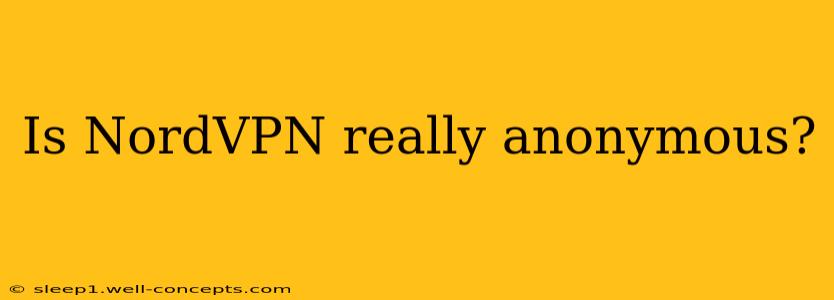The question of whether NordVPN truly offers anonymity is complex and doesn't have a simple yes or no answer. While NordVPN is a popular and reputable VPN provider, achieving complete anonymity online is incredibly difficult, if not impossible. This article will delve into the strengths and limitations of NordVPN regarding user privacy and anonymity, helping you form your own informed opinion.
Understanding the Anonymity Spectrum
Before we assess NordVPN, let's clarify what "anonymity" means in the context of online activity. It's a spectrum, not a binary state. At one end, you have complete anonymity, where your identity and actions are untraceable. At the other end, you have no anonymity – your every online move is readily identifiable. Most VPNs, including NordVPN, aim to move users closer to the anonymity end of the spectrum, but complete anonymity is rarely, if ever, achievable.
NordVPN's Security Features: Strengths and Weaknesses
NordVPN boasts a range of features designed to enhance user privacy:
Strengths:
- Strong Encryption: NordVPN uses AES-256 encryption, a widely considered industry-standard encryption protocol that is exceptionally difficult to crack. This protects your data in transit.
- No-Logs Policy: NordVPN maintains a strict no-logs policy, meaning they claim not to store any data that could identify individual users or their online activities. Independent audits have been conducted to verify aspects of this policy, although complete transparency remains a challenge for all VPN providers.
- Kill Switch: This feature automatically cuts your internet connection if the VPN connection drops, preventing accidental data leaks.
- Double VPN: This feature routes your traffic through two VPN servers, adding an extra layer of encryption and obfuscation.
- Onion Over VPN: This allows you to connect to the Tor network through NordVPN, adding another layer of security and anonymity.
Weaknesses:
- Jurisdiction: NordVPN is based in Panama, a country with less stringent data retention laws than many other nations. However, even Panama isn't entirely free from government requests for data.
- Data Breaches (Past Issues): While NordVPN has since improved security, past vulnerabilities have raised concerns about the security of user data. Trust is crucial, and past breaches can erode it.
- Reliance on Third-Party Audits: While audits bolster trust, they don't guarantee complete and absolute anonymity. There are always limitations to what an independent audit can uncover.
- Metadata: Even with a strong no-logs policy, metadata (information about your activity, not the content itself) could potentially be collected and analyzed. This information could still link your actions back to you.
Achieving Greater Anonymity with NordVPN (and Beyond)
To maximize your anonymity when using NordVPN or any VPN service, consider these additional steps:
- Use a secure payment method: Avoid using methods that can be easily linked back to you, like credit cards. Cryptocurrencies offer greater privacy, although they are not without their own risks.
- Use a privacy-focused browser: Browsers like Tor Browser offer stronger privacy protection compared to mainstream options.
- Be mindful of your online activity: Avoid activities that can compromise your anonymity, such as using easily identifiable personal information online.
- Use a dedicated email address: Create a separate email account specifically for online activities where anonymity is important.
Conclusion: Realistic Expectations
NordVPN offers robust security features designed to improve your online privacy and make it significantly more difficult to track your online activity. However, complete anonymity is an extremely difficult goal to achieve. The strength of NordVPN lies in significantly reducing your digital footprint, making it harder for others to identify and track you. Remember that even with NordVPN, responsible online behavior and awareness are crucial for maintaining your privacy. There are inherent limitations to any VPN, and understanding these limitations is vital for managing your expectations about online anonymity.

